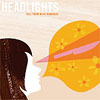 Last fall, when I was listening to the Headlights’ EP persistently, I saw that they were playing a bunch of shows in the Boston area. I didn’t make it to any of them. This was part laziness and part befuddlement. My irrationality aside, I am kicking myself presently because Headlights’ full-length Kill Them With Kindness explains how an unassuming band which plays obscure shows can conjure a remarkable album’s worth of pleasant indie-pop rockers and ballads, the perfect arrangement for a any high school or basement show despite its numbers and ages.
Last fall, when I was listening to the Headlights’ EP persistently, I saw that they were playing a bunch of shows in the Boston area. I didn’t make it to any of them. This was part laziness and part befuddlement. My irrationality aside, I am kicking myself presently because Headlights’ full-length Kill Them With Kindness explains how an unassuming band which plays obscure shows can conjure a remarkable album’s worth of pleasant indie-pop rockers and ballads, the perfect arrangement for a any high school or basement show despite its numbers and ages.
The pseudo-baroque orchestral opening to “Your Old Street” confused me until I heard the nudity of the song’s stark opening; chamber pop gives way to just Tristan Wraight’s and Erin Fein’s vocals with a soft bed of strings and brushed percussion. It takes over two minutes before the signature chirpiness of Headlights shows up. The contrast between the prelude and the song’s core is the essence of the band. They throw sounds off the wall and bounce them around to recombine with more conventional pop standards. Once again, the results seemingly work, but I don’t know why. It just sounds good. Fein’s playful vocals run up and down throughout the song, radiating little lyrical flourishes and subtleties. It could take a few listens to understand their impact. But it’s all just prolegomena to the anthemic centerpiece of the album. “TV,” as I have intimated before, is two and a half minutes of perfected pop. The crescendoing vocal energy grows beyond measure; it plateaus three-quarters through only to pick up momentum at the very end. The song is all about timing, the same way that its titular subject is. Consider the Law & Order syndication phenomenon with which everyone will be familiar: when A&E still had the syndication rights to Law & Order, they would play two back to back episodes (three times a day), allowing the first to finish entirely, credits and all, before starting the next.
Now, by splitting the screen into two halves, TNT (which admittedly shows more episodes per day) enjambs the start of the subsequent episode under the credit titles of the previous episode. The whole effect of the timing is rushed, squinty, and wrong. Headlights offer a more A&E approach to their music, an antithesis to the TNT economy. Each note, each song is justly rounded off and completed before going on to the next. Songs or notes can be fast and efficient, but they never impinge or intercede. The re-recorded version of “Put Us Back Together Right” cleans up the song from the 7-inch but sounds a little antiseptic for the effort. Still a rousing and fine song, it simply loses a little of the grittiness from the split single (a puff of a labial P-sound here, a yelp there.) The way Fein clips her enunciation of the chorus doesn’t alter the song dramatically but it is just enough to get the sense that the band and/or producer was unnecessarily trying to tighten up the sound for the album. It could be that I just like my indie-pop a little dirty.
The album’s midsection slows down after all the activity of the first three songs. “Lions” feints to pick up the tempo with a short blues-rock-inspired two minutes, but the album actually and ironically reclaims its energy with “Words Make You Tired.” It’s not a prototypical rocker, but the density of the band’s sound here makes you take notice. There are more layers here than a normal Headlights’ song, centered by a pentatonic synthesizer theme which recalls a little of the Magnetic Fields’ “Tokyo A Go-Go.” The album’s end gets even fuzzier with saturated electronics and keyboards. It’s the sound of the future, envisaged from the '80s.
samples:
Read More

